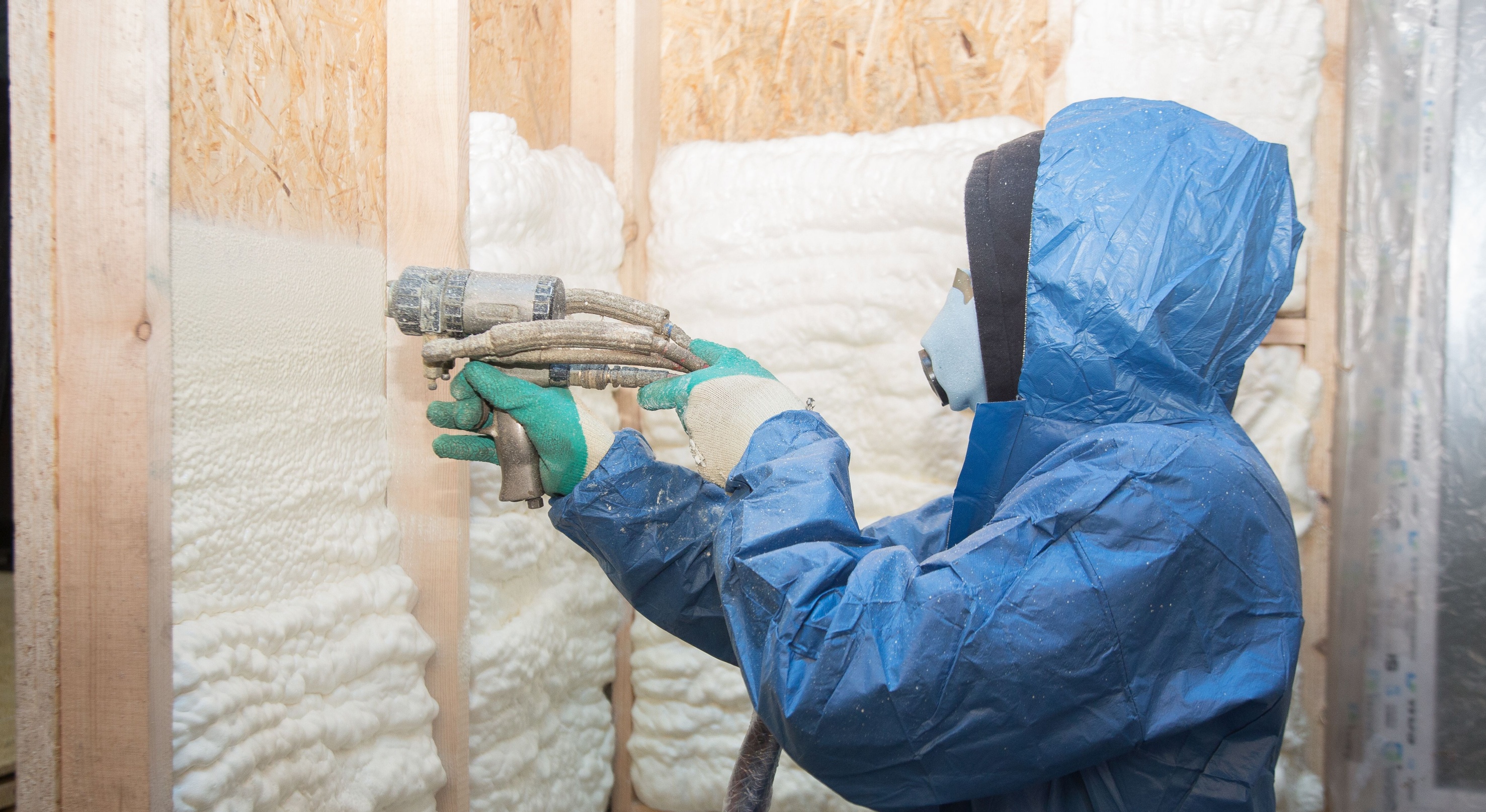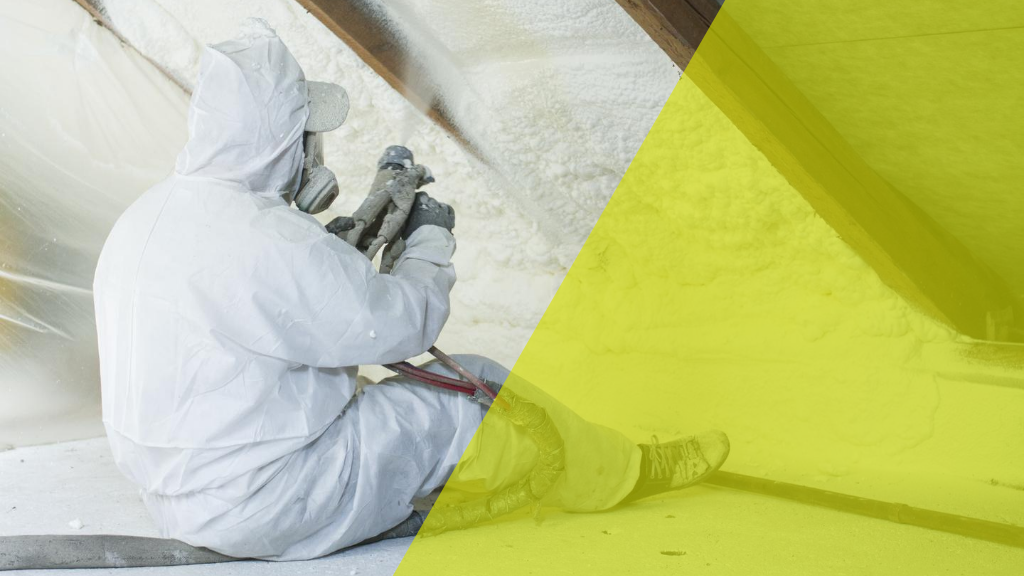Tips for Preserving Your Spray Foam Insulation for Long-Term Efficiency
Tips for Preserving Your Spray Foam Insulation for Long-Term Efficiency
Blog Article
Spray Foam: The Ultimate Remedy for Air Sealing and Insulation
Spray foam insulation has emerged as a leading option for effective air securing and thermal insulation, supplying an unique mix of residential or commercial properties that establish it aside from conventional methods. Its capacity to expand and fill up spaces makes it particularly efficient in stopping air leak, which can considerably influence energy effectiveness. Nonetheless, comprehending the full scope of its advantages, setup processes, and contrasts with other insulation types is essential for making educated choices. As we check out these elements, the effects for both new constructions and retrofits become significantly considerable. What factors should affect your option?
What Is Spray Foam?
Spray foam is a functional insulation product that combines the principles of air securing and thermal resistance to enhance energy effectiveness in structures. Made up mainly of polyurethane or various other similar substances, spray foam is applied as a fluid that increases upon call with surface areas, producing a solid, continual layer of insulation. This distinct residential or commercial property allows it to fill up gaps, cracks, and spaces that typical insulation materials might overlook, offering a premium air seal.
There are 2 major kinds of spray foam: open-cell and closed-cell. Open-cell spray foam is lighter and much more adaptable, providing superb audio absorption and a reduced R-value per inch - Spray Foam. On the other hand, closed-cell spray foam is denser, offering a higher R-value, wetness resistance, and included architectural honesty to developing parts
The application procedure usually includes specialized tools, ensuring a seamless application that follows numerous substrates, consisting of timber, steel, and concrete. This adaptability makes spray foam appropriate for both new buildings and retrofitting existing frameworks. Its capacity to create a closed obstacle considerably adds to reducing energy usage and improving indoor air high quality, thereby making it a recommended choice among home builders and homeowners alike.
Benefits of Spray Foam Insulation
One of one of the most substantial benefits of spray foam insulation is its exceptional capacity to develop a constant air barrier, which properly decreases energy loss. Unlike typical insulation materials, spray foam increases to fill up gaps and splits, ensuring that air leak is drastically lowered. This characteristic not only improves power effectiveness however likewise brings about lower energy bills in time.
Furthermore, spray foam insulation supplies remarkable thermal resistance, adding to an extra stable indoor atmosphere. Its high R-value per inch permits reliable insulation in confined areas, making it perfect for attic rooms, wall surfaces, and crawl areas. Moreover, the moisture-resistant residential or commercial properties of spray foam help prevent mold and mildew and mildew growth, advertising healthier living conditions.
An additional crucial benefit of spray foam insulation is its sound-dampening top qualities (Spray Foam). It efficiently decreases noise transmission between rooms, producing a quieter and much more comfortable home environment. The resilience of spray foam likewise attracts attention, as it does not droop or clear up in time, maintaining its efficiency throughout its life expectancy
How Spray Foam Works
Recognizing just how spray foam insulation functions is important for valuing its performance in air sealing and thermal resistance. Spray foam insulation is composed of two main parts: isocyanate and polyol resin. When these parts are blended, they undertake a chain reaction that triggers the material to expand rapidly, creating a thick foam that fills up splits, spaces, and tooth cavities.
As the foam expands, it complies with surface areas, creating a closed seal that dramatically minimizes air infiltration. This characteristic makes spray foam insulation very efficient at protecting against drafts and moisture penetration, which can result in power loss click here for more and damages gradually. Furthermore, the closed-cell version of spray foam offers remarkable thermal resistance due to its inflexible structure, properly lessening warm transfer.
The one-of-a-kind residential or commercial properties of spray foam permit it to satisfy irregular surfaces, making certain thorough coverage and a smooth obstacle. Consequently, spray foam insulation not just enhances power performance yet also contributes to boosted interior air high quality by lowering the accumulation of pollutants and irritants. Ultimately, recognizing the technicians behind spray foam highlights its function as a superior choice for insulation and air sealing in both property and industrial applications.
Setup Refine Review

Before installment, the room has to be adequately cleansed and prepped, ensuring that surface areas are complimentary from particles, dust, and moisture. Since impurities can endanger attachment and general efficiency, this action is critical. As soon as the location is prepared, the application involves blending the two components of the spray foam, which increases upon get in touch with and loads voids properly.
Trained experts need to perform the installation, making use of specialized equipment to make certain uniform protection and optimum density. Safety and security preventative measures, including wearing safety gear and ensuring appropriate ventilation, are essential throughout this procedure. After application, the foam commonly cures quickly, developing a strong obstacle that improves energy efficiency.
Comparing Spray Foam to Standard Insulation
When evaluating insulation options, spray foam insulation sticks out in contrast to standard materials such as fiberglass and cellulose. One of the main advantages of spray foam is its superior air securing capabilities. Unlike fiberglass and cellulose, which can allow air seepage, spray foam increases upon application, filling up spaces and holes to develop an impermeable seal. This results in enhanced energy efficiency, as much less heated or cooled air runs away the home, resulting in lower energy costs.
In addition, spray foam offers a greater R-value per inch than standard insulation types, using more effective thermal resistance in a thinner account. This particular is especially advantageous precede with limited cavity depth. Additionally, spray foam is resistant to dampness and mold development, which can be a significant concern with cellulose and fiberglass, especially in damp settings.
Nevertheless, spray foam insulation normally lugs a higher ahead of time cost than its typical counterparts. Property owners should weigh this first investment versus long-term power savings and efficiency advantages. Ultimately, while both insulation kinds serve their objective, spray foam becomes an advanced option for modern insulation requirements, particularly in terms of air securing and thermal effectiveness.

Verdict
In recap, spray foam insulation stands for a very efficient solution for achieving optimum air securing and thermal resistance. Its special buildings, including wetness resistance and sound dampening, make it ideal for different applications in both brand-new building and constructions and retrofitting jobs (Spray Foam). Although the first expenses might be greater contrasted to conventional insulation products, resource the lasting benefits, such as significant energy cost savings and improved interior air quality, justify the investment and underscore its value in contemporary building practices.
Spray foam insulation has arised as a leading remedy for reliable air securing and thermal insulation, using an one-of-a-kind mix of properties that establish it apart from conventional techniques.Spray foam is a functional insulation product that integrates the principles of air sealing and thermal resistance to boost energy effectiveness in structures.When reviewing insulation choices, spray foam insulation stands out in comparison to conventional products such as fiberglass and cellulose. Inevitably, while both insulation kinds offer their function, spray foam emerges as a much more sophisticated option for contemporary insulation requirements, especially in terms of air sealing and thermal efficiency.
In summary, spray foam insulation represents an extremely efficient solution for achieving optimal air sealing and thermal resistance.
Report this page